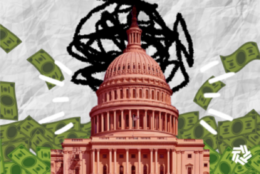Congress
-
Congress has delayed the online financial disclosure requirement of the STOCK Act for a month. But already this provision that affects 28,000 senior members of the executive branch is deterring high-level feds from joining the ranks of senior executives, according to the Senior Executives Association.
August 06, 2012 -
The rule, aimed at preventing fraud in the VA service-disabled veteran-owned small business program, requires that veterans control 100 percent of company decisions, even if they maintain just partial ownership. VA is taking suggestions for changing its rules.
August 03, 2012 -
New legislation from several senators would let DoD reprogram funds without congressional approval.
August 03, 2012 -
Homeland security has improved, but the reforms mean DHS reports to 108 oversight committees and subcommittees, leading to wasted hours at hearing after hearing.
August 02, 2012 -
Congress has delayed by a month parts of an insider-trading law that would have required federal employees to post financial-disclosure forms online Aug. 31. Senate Majority Leader Harry Reid (D-Nev.) introduced the measure Thursday, where it was quickly adopted by both chambers of Congress. The vote came shortly before the American Civil Liberties Union filed a lawsuit in federal court in Greenbelt, Md., on behalf of 28,0000 employees to block implementation of the STOCK Act.
August 02, 2012 -
Agencies should not change their spending plans for this year or next, but need to start assessing which programs would be impacted by automatic sequestration cuts if Congress doesn't cancel them, OMB acting Director Jeff Zients told Congress Wednesday.
August 02, 2012 -
NTEU president Colleen Kelley and Steve Watkins and Andy Medici from the Federal Times will talk about some of the big a wide variey of issues affecting federal workers. August 1, 2012
August 01, 2012 -
Although the word "default" might elicit a sense of urgency in most people, it doesn't appear to be inspiring lawmakers to take action on the proposed Postal Service bill. USPS is expected to default on $5.5 billion in pension costs that it owes to the Treasury.
August 01, 2012 -
Ever watch an inept team of trainees assemble then take apart an explosive device? If not, move to D.C. or watch live coverage of Congress on TV. With Congress, you get the political version which, more often than not, ends in a whimper rather than a bang, Senior Correspondent Mike Causey says.
August 01, 2012 -
Faced with congressional inaction in averting looming across-the-board cuts that take effect in January, the Office of Management and Budget will begin meeting with agency leaders to discuss how the cuts will be implemented. In a memo to agency heads, OMB Director Jeff Zients said his office will consult with agencies to determine which budget accounts and programs are exempt from sequestration.
July 31, 2012 -
The top Republican and Democrat on Capitol Hill have announced an agreement to keep the government running on autopilot for six months when the current budget year ends on Sept. 30. The announcements by Democratic Senate Majority Leader Harry Reid and GOP House Speaker John Boehner are aimed at averting any chance of a government shutdown this fall. The leaders said an official vote on the bill won't come until September.
July 31, 2012 -
The House voted 263-116 to approve the Federal Employee Tax Accountability Act and send it to the Senate. The measure would make those are who are seriously delinquent ineligible for federal employment, whether they're working for the government now or are applying for a job. The House will also vote on final passage of a bill Wednesday to curb misuse of government charge cards.
July 31, 2012 -
Remember the recent cyber attack on more than 100,000 Thrift Savings Plan participants? It's been out of the headlines lately, but lawmakers haven't forgotten about it.
July 31, 2012 -
Good news, bad news. The good news is that the end of the world — in your case, maybe extended furloughs or even a layoff — is likely to be extended. Things are currently scheduled to go boom early next January. But there are signs that Congress may delay the day of reckoning until March or April of 2013. Now your only worry is the Mayan calendar, Senior Correspondent Mike Causey says.
July 31, 2012 -
The U.S. Postal Service is bracing for a first-ever default on billions in payments due to the Treasury, adding to widening uncertainty about the mail agency's solvency as first-class letters plummet and Congress deadlocks on ways to stem the red ink. With cash running perilously low, two legally required payments for future postal retirees' health benefits - $5.5 billion due Wednesday, and another $5.6 billion due in September - will be left unpaid, the mail agency said Monday.
July 30, 2012



